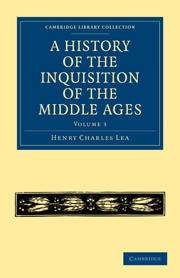Book contents
- Frontmatter
- Contents
- BOOK III SPECIAL FIELDS OF INQUISITORIAL ACTIVITY
- CHAPTER I THE SPIRITUAL FRANCISCANS
- CHAPTER II GUGLIELMA AND DOLCINO
- CHAPTER III THE FRATICELLI
- CHAPTER IV POLITICAL HERESY UTILIZED BY THE CHURCH
- CHAPTER V POLITICAL HERESY UTILIZED BY THE STATE
- CHAPTER VI SORCERY AND OCCULT ARTS
- CHAPTER VII WITCHCRAFT
- CHAPTER VIII INTELLECT AND FAITH
- CHAPTER IX CONCLUSION
- APPENDIX OF DOCUMENTS
- INDEX
CHAPTER VII - WITCHCRAFT
Published online by Cambridge University Press: 29 August 2010
- Frontmatter
- Contents
- BOOK III SPECIAL FIELDS OF INQUISITORIAL ACTIVITY
- CHAPTER I THE SPIRITUAL FRANCISCANS
- CHAPTER II GUGLIELMA AND DOLCINO
- CHAPTER III THE FRATICELLI
- CHAPTER IV POLITICAL HERESY UTILIZED BY THE CHURCH
- CHAPTER V POLITICAL HERESY UTILIZED BY THE STATE
- CHAPTER VI SORCERY AND OCCULT ARTS
- CHAPTER VII WITCHCRAFT
- CHAPTER VIII INTELLECT AND FAITH
- CHAPTER IX CONCLUSION
- APPENDIX OF DOCUMENTS
- INDEX
Summary
While, as we have seen, princes and warriors were toying with the dangerous mysteries of the occult sciences, influencing the destinies of states, there had been for half a century a gradually increasing development of sorcery in a different direction among the despised peasantry, which, before it ran its course, worked far greater evils than any which had thus far sprung from the same source, and left an ineffaceable stain upon the civilization and intelligence of Europe. There is no very precise line of demarcation to be drawn between the more pretentious magic and the vulgar details of witchcraft; they find their origin in the same beliefs and fade into each other by imperceptible gradations, and yet, historically speaking, the witchcraft with which we now have to deal is a manifestation of which the commencement cannot be distinctly traced backward much beyond the fifteenth century. Its practitioners were not learned clerks or shrewd swindlers, but ignorant peasants, for the most part women, who professed to have skill to help or to ban, or who were credited by their neighbors with such power, and were feared and hated accordingly. Of such we hear little during the darkest portion of the Middle Ages, but with the dawn of modern culture they confront us as a strange phenomenon, of which the proximate cause is exceedingly obscure.
- Type
- Chapter
- Information
- A History of the Inquisition of the Middle Ages , pp. 492 - 549Publisher: Cambridge University PressPrint publication year: 2010First published in: 1888



